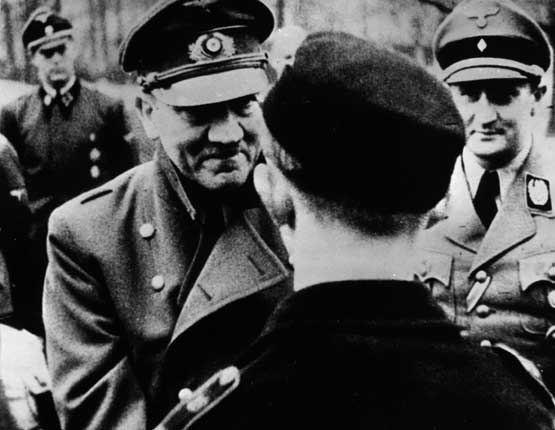The End: Hitler's Germany, 1944-45, By Ian Kershaw
A bunker mentality that infected an entire nation

Your support helps us to tell the story
From reproductive rights to climate change to Big Tech, The Independent is on the ground when the story is developing. Whether it's investigating the financials of Elon Musk's pro-Trump PAC or producing our latest documentary, 'The A Word', which shines a light on the American women fighting for reproductive rights, we know how important it is to parse out the facts from the messaging.
At such a critical moment in US history, we need reporters on the ground. Your donation allows us to keep sending journalists to speak to both sides of the story.
The Independent is trusted by Americans across the entire political spectrum. And unlike many other quality news outlets, we choose not to lock Americans out of our reporting and analysis with paywalls. We believe quality journalism should be available to everyone, paid for by those who can afford it.
Your support makes all the difference.Germany sued for peace in 1918, not when its leaders saw that the First World War had been lost, but when they prudently realised that the war could no longer be won.
Remarkably, Allied soldiers had not yet – at that point – even set foot on German soil. How different it would all be a generation later. In 1945, Hitler fought on, well past the point at which any hope of ultimate victory could be entertained, seemingly revelling in the horror and slaughter engulfing Germany.
This paradox is at the heart of Ian Kershaw's new book, The End. Why, he asks, did German politicians, soldiers and civilians continue their dogged, futile resistance in 1944-45? Why was there no internal revolt, like the one that toppled Mussolini? Why did the German people not protest when all was so patently lost? These are very valid questions.
The last 10 months of the war saw a vast acceleration of casualty rates in almost every sector. Nearly half of all German combat deaths, for instance, were registered during that period, while the escalation of the air war gave the world the horror of Dresden. Elsewhere, this was the period of the death marches of concentration camp inmates, the combat debut of the hopeless Volkssturm militia and of the mass rapes and mass suicides of German civilians. Given such tremendous costs, it clearly behoves us all to ask why Germany continued fighting against such murderous odds.
Kershaw adopts a largely narrative approach, which – with various digressions – spans the period between the failed attempt on Hitler's life of 20 July 1944 and the German capitulation 10 months later. In this period, horrors at the front – such as the first Red Army incursion into German territory at Nemmersdorf in East Prussia – would increasingly be matched by horrors at home, as the murderous SS condemned to death all those who dared to resist or showed insufficient martial spirit.
Of course, propaganda and terror are but two of the many factors that contributed to draw out Germany's demise. Loyalty to Nazism also played a role, as did other more nebulous factors such as the supposed innate obedience and conformity of the German people, and the Allied doctrine of unconditional surrender, which appeared to rob moderate Germans of a viable alternative to continued defiance.
But for all the respective merits of these arguments, Kershaw is convincing in laying the blame for the disastrous decision to "hold out" primarily at Hitler's door. Not only was the dictator personally obsessed with the idea that a heroic defeat was preferable to any form of surrender, he had also concentrated such an unchallenged system of power in his own hands that he was effectively able to drag all of Germany with him into the abyss. It is telling, indeed, that only Hitler's suicide on 30 April 1945 opened the way to a German capitulation.
A respected authority on the subject of Hitler and the Third Reich, Kershaw is a sure-footed guide through the Hades of the final dark months of the war in Europe. If there is a complaint to be raised with the book, it is that he does not make enough effective use of the many human stories that he unearths. Nonetheless, his is a thoughtful and thought-provoking account, which admirably combines analysis, historiography and commentary within a very readable narrative.
Join our commenting forum
Join thought-provoking conversations, follow other Independent readers and see their replies
Comments